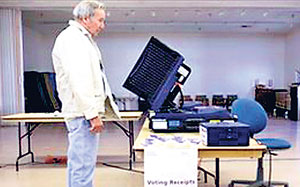Just two years ago, the campaign apparatus of President Barack Obama was lauded for pulling a diverse mix of voters to the polls. Pundits dubbed it "the Obama coalition".
Drawing heavily from young people, African-Americans, Hispanics, women and university-educated people, the Obama coalition looked set to become the new norm in Democratic politics, a new political force that would usher in an era of Democratic dominance.
On Tuesday, the Obama coalition fell apart.
Some commentators saw the fractures coming. In November 2008, Amy Walter, then of the National Journal, wrote: "The good news for Obama is that [his coalition is] ready for him to turn the page. But the bad news is that they expect him to - and if he does, it's still not clear they'll stick with him."
Others warned that the voters Mr Obama had relied upon in 2008 had always had a poor record of turning out for mid-term elections. That was borne out this year: in 2008, 18% of voters were under 30. On Tuesday, just 9% were.
But Tuesday's exit polls suggest that not only did crucial parts of the Obama coalition stay home, many who actually went to the polls deserted the president's Democrats. Of those under-30 voters, 57% voted for Democrats, compared with 66% who voted for Mr Obama in 2008.
Demographic shifts
Perhaps the biggest shift was among first-time voters - notably young people and blacks - who Mr Obama got to the polls in astonishing numbers. In 2008, 11% of voters entered a polling booth for the first time, and 69% of them voted for Mr Obama.
In 2010, only 3% of voters said it was their first time, and among them, 49% voted Democrat, and 46% voted Republican.
The most decisive group in US elections are self-identified "independent" voters. In 2008, Obama won this group with an eight percentage-point margin. This year, they gave Republicans a 15-point advantage.
Women have preferred Democratic candidates in all but one of the past 14 election years - that was in 2002, when America was still reeling from the 9/11 attacks. Mr Obama won the women's vote by a whopping 13 points in 2008. Yet on Tuesday, women voted for Democrats and Republicans in equal numbers.
As a proportion of the electorate, fewer blacks and Hispanics voted in 2010 than 2008 - which is consistent with other mid-term elections. But the degree to which they voted for Democrats also declined - by five points among African-Americans and three points among Hispanics.
Democratic support from Asian voters, who only make up about 1-2% of the electorate, declined by six points. (One exception though was Nevada, where 79% of Asians voted for Democratic Senator Harry Reid, perhaps prompted by his opponent's remark that a group of Hispanic students "looked like Asians" to her.)
As a group, older voters have never cared much for Mr Obama. This year, older voters continued to stay away from his Democrats, voting 59% Republican.
Similarly, in 2008, Mr Obama struggled to win over those white working class voters who had long been core Democratic voters. In 2010, white working class men preferred Republicans by 13 points; women in the same category preferred them by 8 points.
Tea Party influence
The Tea Party wasn't a factor in the 2008 election - it didn't even exist then. But in the past two years it has become a rambunctious political force, and one that seems to have divided the country.
About 40% of voters say they support the movement and its goals; 31% oppose it and 24% claim to be neutral about it.
 |
| Marco Rubio and family Florida Senator-elect Marco Rubio was one of the Republicans riding the wave of support. |
 |
Unsurprisingly, the split follows party lines: of those who strongly oppose the movement (23%) 90% voted for Democrats while of those who strongly support the Tea Party (21%), 91% voted Republican.
Those who described themselves as neutral with regard to the Tea Party split fairly evenly between Republicans and Democrats - 50% and 47% respectively.
Still, 55% of voters said that the Tea Party wasn't a factor in their votes, while 23% said their vote was intended to send a message of support to the Tea Party, and 18% said they voted to voice their opposition.
Mr Obama was more of a factor - 37% cast their ballots to show opposition to the president; just under a quarter to show support. But 36% weren't concerned with the president at all on Tuesday.
Economy anxiety
Anger was the defining characteristic of the 2010 election, with voters determined to punish Mr Obama and the Democrats for the country's sluggish economy and anaemic job numbers.
According to exit polling conducted by ABC News, 88% of voters cited the economy as the number one issue influencing their vote, and at least half of them said they were "very worried" about it.
Perhaps even more telling is that almost three in 10 voters told ABC's pollsters that somebody in their household had lost a job in the past two years.
Antipathy towards government was another motivating factor, with 73% of voters describing themselves as angry or dissatisfied with Washington DC.
Beyond just the economy, Mr Obama's policies have fallen out of favour, with 53% of people saying his actions will hurt America over the longer term, rather than help it.
Courtesy BBC |




